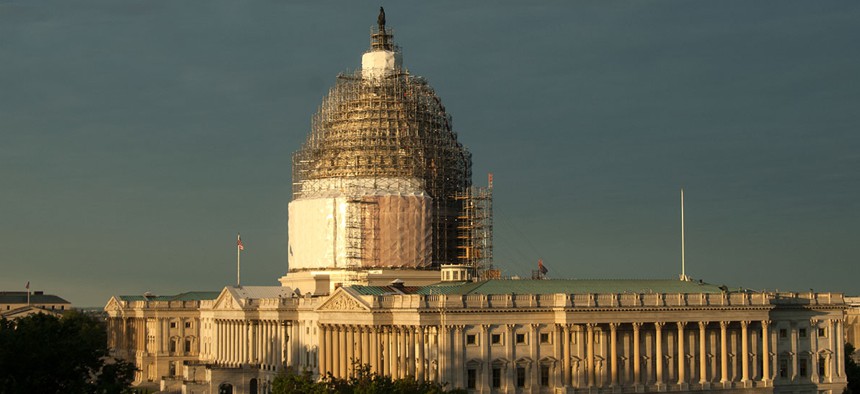
Architect of the Capitol
Cybersecurity Bill Still in Senate Limbo
The vote hinges on an agreement that would fast-track the information-sharing bill so that it could wrap up before recess.
The cybersecurity bill that has been the subject of intense debate in the weeks before the Senate's summer recess remains in limbo Wednesday afternoon.
Senators have been working for days on an agreement about which amendments to include on the cyber bill, but pulled the plug on a vote scheduled first for 10:30 a.m. and then for 2 p.m. at the last minute as talks continue.
Sen. Richard Burr, one of the bill's co-sponsors, said the Senate would likely not vote on the bill this week. A senior Democratic aide said Majority Leader Mitch McConnell will likely pull the cybersecurity bill, clearing the way for senators to head home for recess.
The bill—put forward by the top members of the Senate Intelligence Committee, Sens. Burr and Dianne Feinstein—would offer incentives to the private sector to share information about cyberthreats with the government.
Supporters, including senators from both parties and many in the private sector, say the information sharing legislation would make for stronger cyberdefenses against hackers. But privacy advocates in and out of the Senate have raised flags about the bill's treatment of Americans' sensitive information, saying it will violate personal privacy, and security experts have questioned the bill's effectiveness.
Several Republican senators said that negotiators were discussing timing for both the cyber bill and the Iran deal, which is expected to be the first topic the Senate takes up when it returns from the August recess.
It is likely that final votes on the cyber bill would wait until after recess, coming on the heels of a lengthy Iran debate and further flooding an already-packed September schedule for senators.
A Democratic aide said a proposal that would allow votes on 20 Democratic amendments was being circulated Wednesday afternoon.
The vote to move forward on the bill was initially scheduled for 10:30 a.m., but Majority Leader Mitch McConnell postponed it until the 2 p.m. to allow senators more time to negotiate over amendments. He said he and Reid had "made some progress" toward reaching a deal.
The holdup is over which amendments will be included, Leahy said Wednesday morning. "I think both sides have serious amendments we'd like," he said. "We've spent now, on two different bills, what, how many weeks debating abortion? We've got to debate some real things like cybersecurity, and have real amendments, not pretend amendments."
According to congressional Democratic sources, Democrats had by late morning largely agreed upon a set of changes they wanted to see. Republicans took advantage of a regularly scheduled policy lunch before the vote to try to settle on package of their own amendments to offer.
Senators from both sides of the aisle have called for changes to the Cyber Information Sharing Act, or CISA, and have put forward dozens of proposals. The amendments included offerings from the Senate's privacy advocates—Democrats Patrick Leahy and Ron Wyden, and Republicans Rand Paul and Mike Lee—as well as efforts to increase the cybersecurity of federal agencies from Sens. Mark Warner and Ron Johnson.
But not all the proposed amendments are on topic. Paul proposed three changes that have nothing to do with cybersecurity: one to allow the government to audit the fed, another about immigration policy, and a third that would allow servicemen and women to carry weapons on military bases.
The unrelated amendments Paul put forward were one of the bigger hurdles the Republican caucus had to deal with in reaching an agreement amongst themselves, a Republican Senate aide said Wednesday.
Earlier Wednesday, Feinstein spoke on the Senate floor about more than a dozen "privacy information improvements" she and Burr made to the bill, recited a list of cyberattacks that affected millions of Americans in the past year, and named some of the bill's supporters in the private sector. "I make these remarks in hopes that it can clear the air somewhat and when a cloture vote does come at 2 o'clock, that we have the votes to proceed," Feinstein said.
The Senate got a late start on the cyber bill this week in part because McConnell prioritized a vote on defunding Planned Parenthood. After senators voted not to move forward on that measure, McConnell filed cloture on CISA. The earliest the Senate was allowed to vote to move forward on CISA was Wednesday morning.
Since senators have made it clear that they will not stay in Washington past Friday, senators must either move on CISA within the next few days or shunt it to the already-crowded fall, alongside fights over the Iran nuclear deal and the budget.
Sarah Mimms and Alex Rogers contributed to this article.







